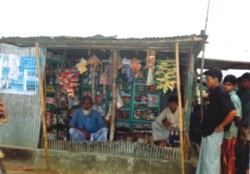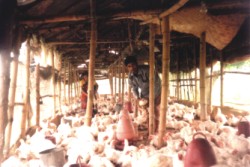 |
Relative who were financially dependent on the victims who died in the building collapse, are now leading a better life by starting small projects funded by Friendship. |
On April 11, 2005, 30-year-old Md. Ali Sheikh became the unfortunate victim of the Spectrum Garments building collapse where a number of night-shift workers were trapped and eventually died. Ali left behind his sister, 25-year-old Shantona Begum who had been paralysed since childhood and a stepmother in the district of Joypurhat. He was the only refuge for his sister and stepmother as Ali used to support them with at least Tk 1400-1500 every month. None of the stepsiblings were ready to take care of their stepsister Shantona and their mother, though they all lived nearby. Shantona and her stepmother were unable to work for a living. Because of acute poverty and physical conditions, they could not approach any NGOs for help.
Almost all the relatives of the dead victims received an amount of Tk 1,00,000 as compensation (Tk 79,000 from BGMEA and Tk 21,000 from the Labour Court). However, Shantona and her stepmother were deprived from this compensation simply because they lived in a remote area and could not communicate to the authorities through the proper channels. On the other hand, the authorities procrastinated trying to decide if the compensation money could be given to the stepmother or the sister, since the conditions stated that only the victims' immediate relatives including parents or wives would receive the money.
 |
Many have now opened up shops and running businesses. |
 |
That was when, through an assessment survey, Friendship's researchers came to know about Shantona Begum's plight. Friendship officials purchased a piece of land for Shantona with a house on it, which was fixed and repaired. Friendship also bought four goats for Shantona and her stepmother, so as to live financially independent lives.
Friendship, a national NGO, had started out with the Savar Garments Rehabilitation project in April 2005, immediately after the collapse of the building. "Immediately after the incident, relief and rehabilitation activities were initiated by the owner, the BGMEA, trade unions and foreign buyers, working through different NGOs to support the victims of the garments' collapse," says Runa Khan, the executive director of Friendship. Famous for its expertise in relief and rehabilitation work, especially in the char areas in the northern part of the country, the rehabilitation activities that the organisation has been working on in Savar have been funded by Carrefour, the second biggest retail outlet in the world, ranking right after Walmart. "Carrefour had also funded Friendship, during our relief projects in 2004 for the flood victims," says Runa. "We could provide food and other basic necessities to 125 chars in four districts."
At the first step, Friendship, with the help of Carrefour, focused on the immediate needs of the victims, the relatives of the dead and the survivors. "We needed a list of the victims, which was absolutely impossible to find," says Runa. "In fact nobody knew the right number. Local union leaders would say that at least five hundred to a thousand died upon asking. However, we had to be completely sure before going on with the rehabilitation work." The building had collapsed when the night shift had begun at the factory. "Many of the workers had come out of the building," says Runa. "However, the sign-in and sign-out list was stuck under the debris, along with the night guards who died after the collapse."
 |
Shantona Begum is now confidently earning a living for herself and her stepmother in Joypurhat. |
Eventually, with the help of the Trade Union, ASK, the owners and BGMEA, a quick survey and the listing of the victims were done. Munir Hossain, AD for Programme, Friendshp, says that categorising the victims into the dead, the injured (both major and minor), and traumatised was the most difficult job of all. "A total of 67 dead 55 injured victims were identified," he says. After positive identification, immediate food and other support expenses were given to 111 beneficiaries. "Emergency medical help had been given by many NGOs," says Runa. "So we decided to concentrate on the other needs of the victims, by providing doctors' check up fees, medicines, wheelchairs and crutches. We also helped the people to open bank accounts for the funds received from BGMEA."
However, after discussions with the victims and their families, it was found that they needed immediate support for income generation - and also to needed to get back their self-respect. A sewing machine or a van was a quick source of income, which was immediately distributed by the organisation, but that was not all. Interesting discoveries were made. "We decided to go around and actually see what the victims did with the money that was given to them for the immediate crisis that they had faced," says Runa. "Many of the victims who were not able to come to Dhaka were left out of care by many organisations. Some of the victims, who got the funds, used most it up for decorating graves and feeding relatives, but not for income generation. One such victim was approached by his sister's husband to deposit the compensation that the victim received in his (the brother-in-law's) account, since the victim never had a bank account. That's when we realised that just giving them what they wanted was not enough. Most of these people are not educated, are not aware of what goes on around them practically."
 |
The scheme designed and developed by Friendship has engaged relatives of victims and survivors into sustainable income generation activites. |
Friendship, started off with the second phase of the rehabilitation project. Once again they identified and located the victims, only this time they conducted a thorough research in each case. "There were 118 families who had to be supported financially," says M Enamul Haque the programme manager of Friendship. "We sat down with each family and discussed what they wanted to do to for income generation. Some wanted to open small grocery stores, some wanted cows and goats, some wanted more resources for the poultry farms that they had. We discussed the pros and the cons of starting such businesses. For instance, someone who wanted to open a small shop, had to realise the market demand of what he wanted to sell in the locality, if his plans were actually relevant to his social surroundings and so on. It was like working on 118 different projects all together!" Each project required a bank account, which could be opened in any nearby bank in the area. "This was done so that we did not have to work with any more of the cash dealings over the counter," says Runa.
Eventually, the scheme designed and developed by the organisation to ensure proper rehabilitation of the victims through engaging them into sustainable income generation activities worked for a positive change in the lives of these people. "They are now earning a more than what they used to at one time," says Enam, who has been working alongside the victims right from the beginning.
"We are about to start off with the third phase of the project," says Runa Khan. This part of the project involves the education of the victims' children. "We will begin this part with the co-operation of Carrefour, Karstadt Quelle and Cotton Group (B&C) in a few months time."
"Eliminating poverty starts with feeding a hungry stomach," says Runa Khan, or righting the wrongs in a disrupted society begins with fulfilling the basic requirements of a human being. "Only then can one think of further development and a better life."
Volume 6 Issue 16 | April 27, 2007 |
Copyright (R) thedailystar.net 2007
No comments:
Post a Comment